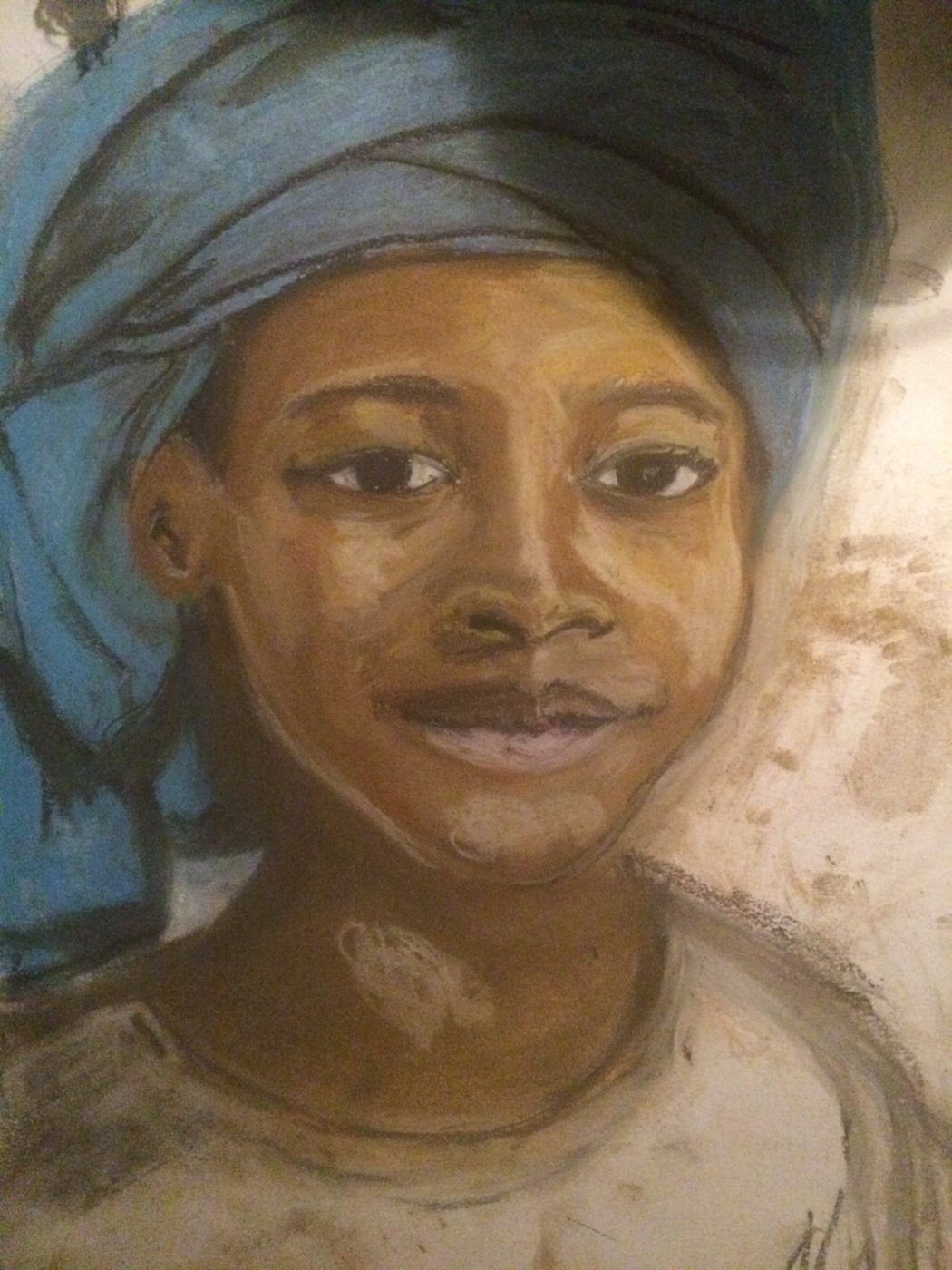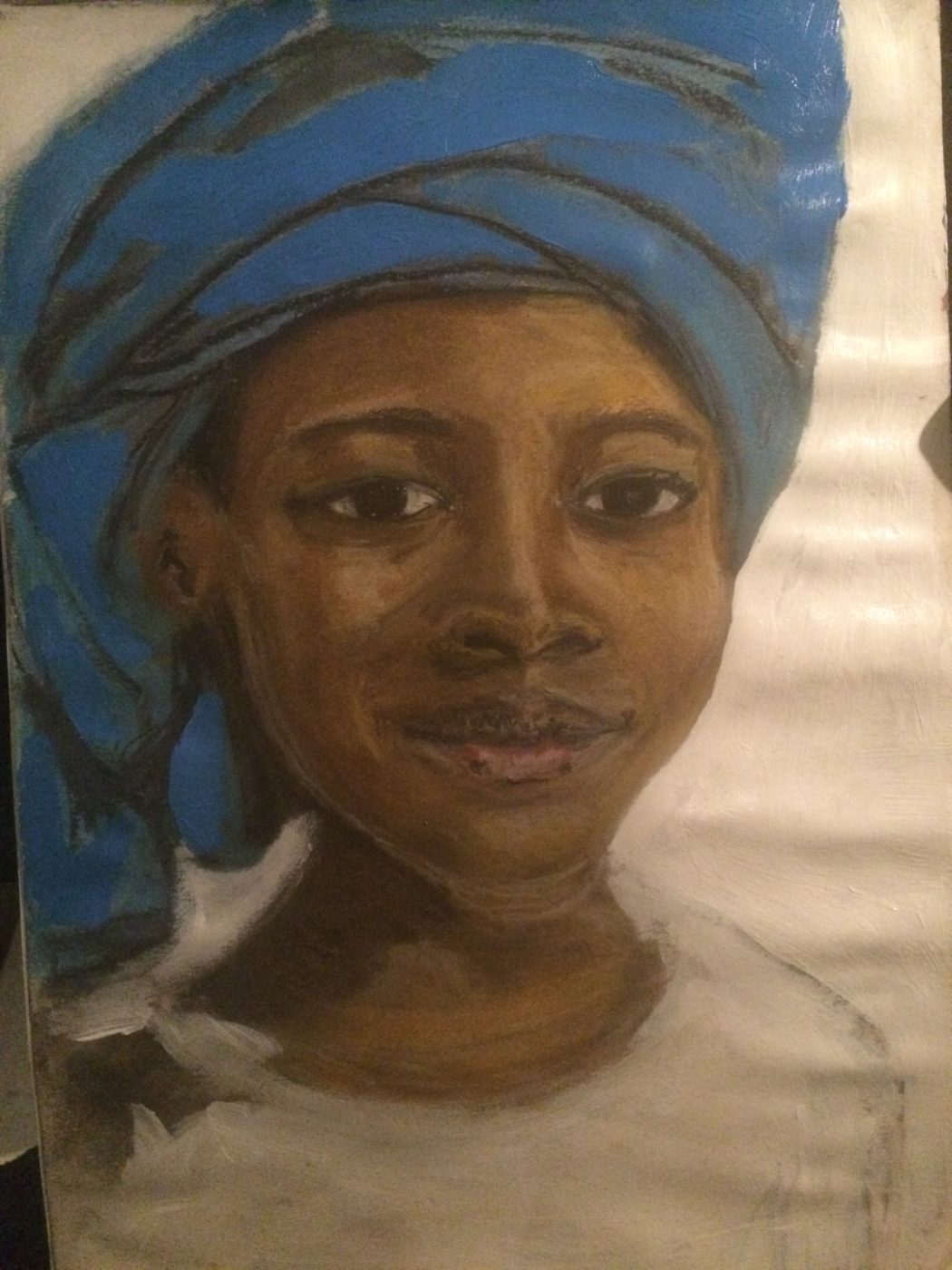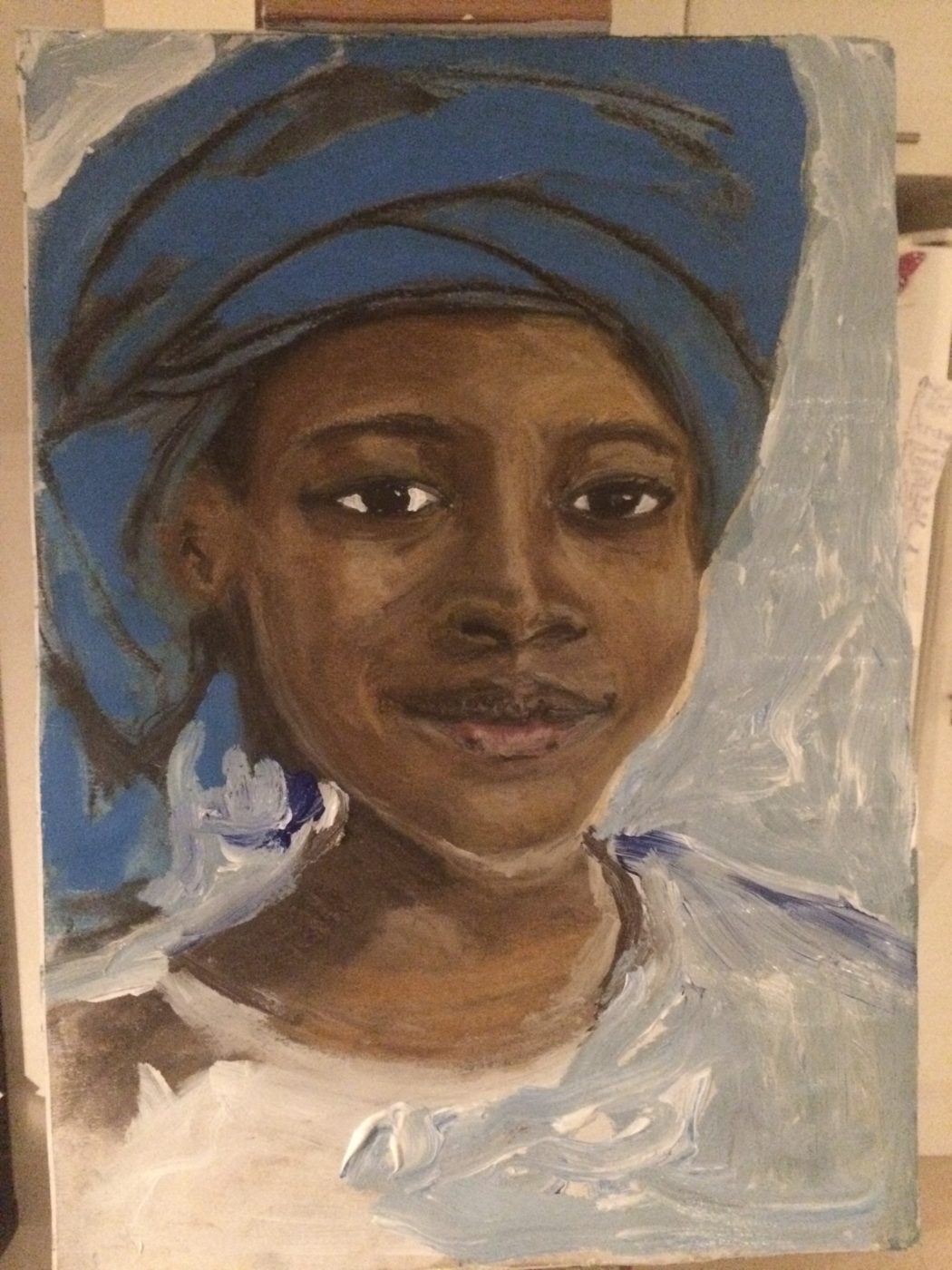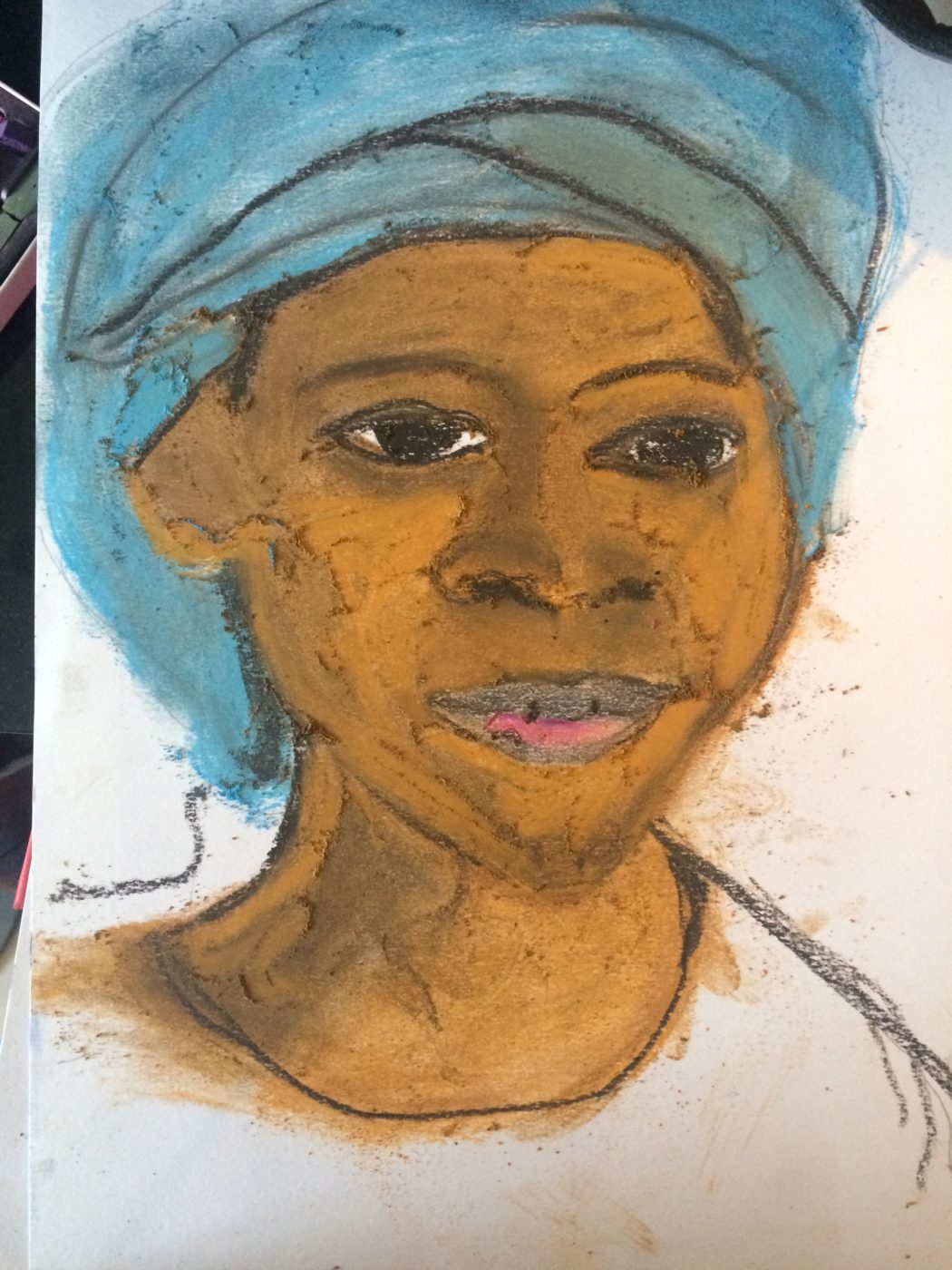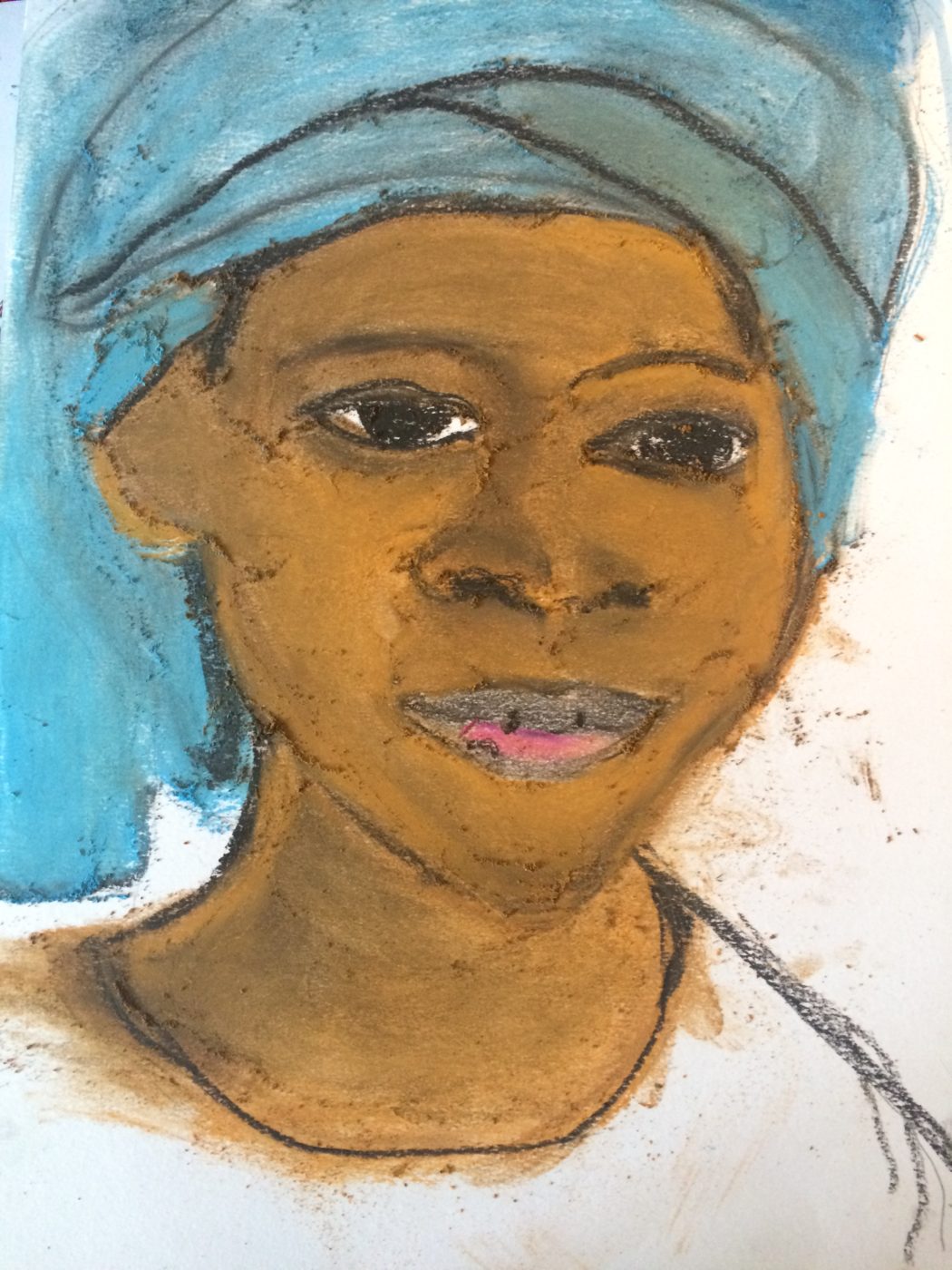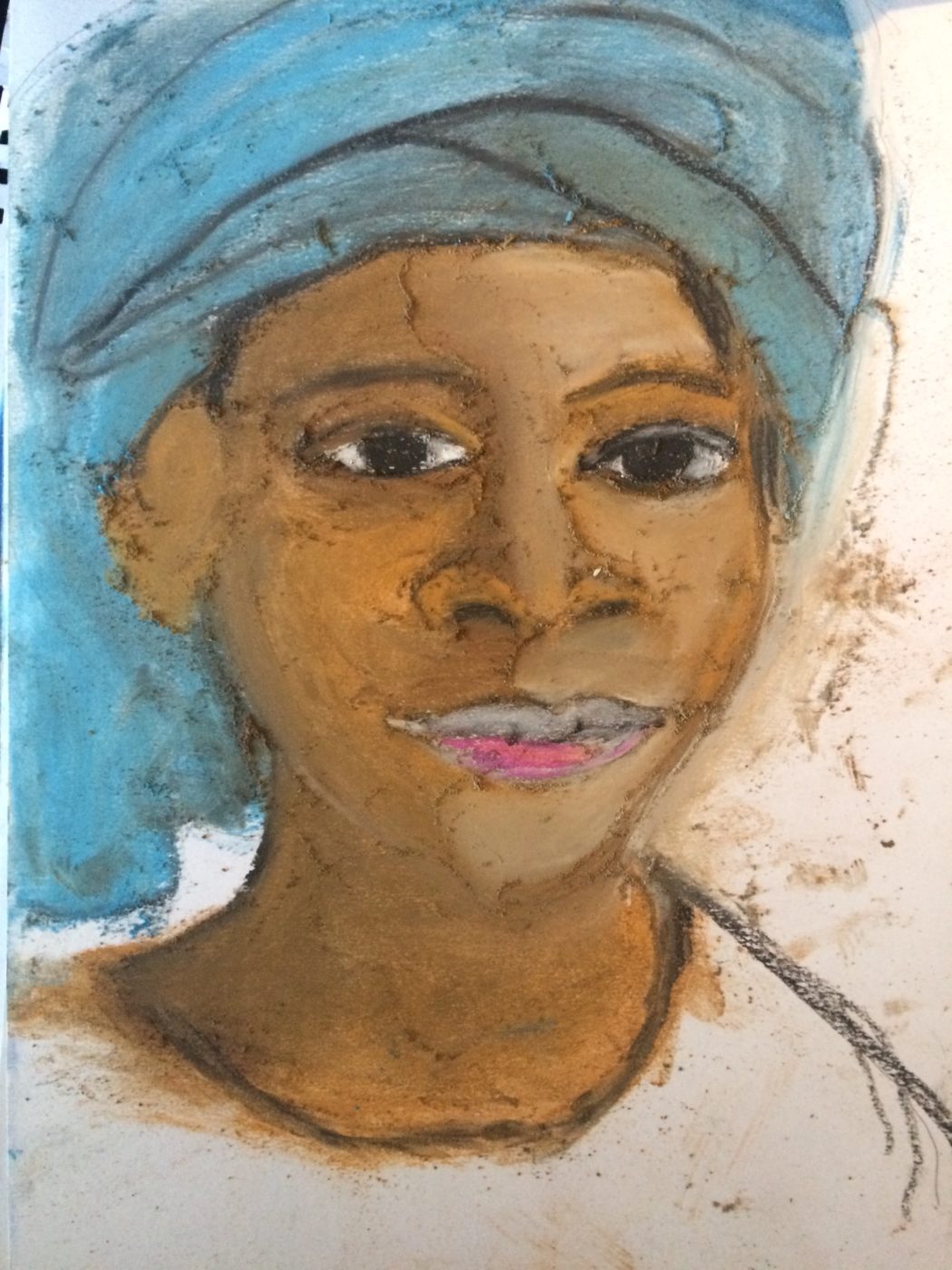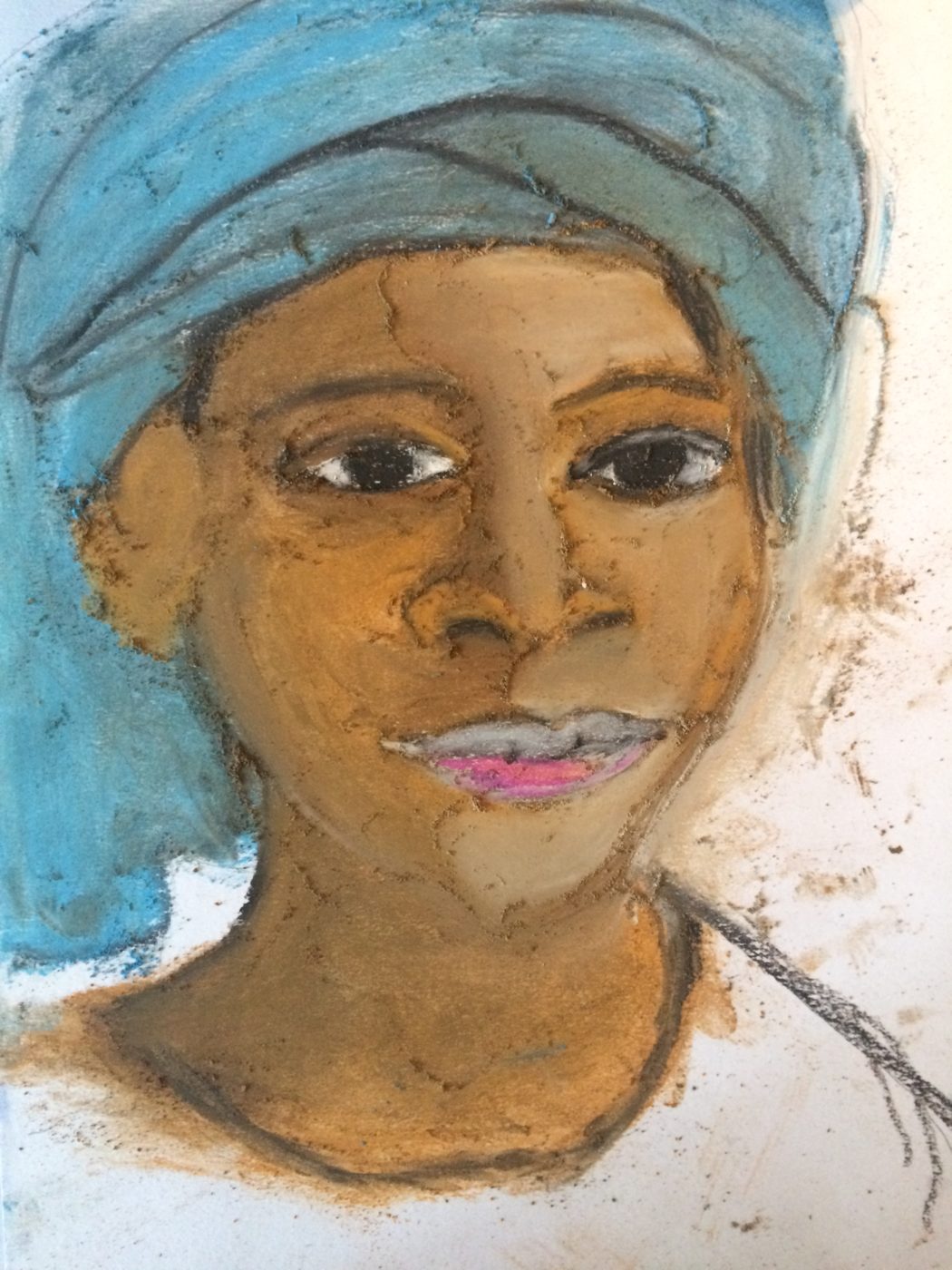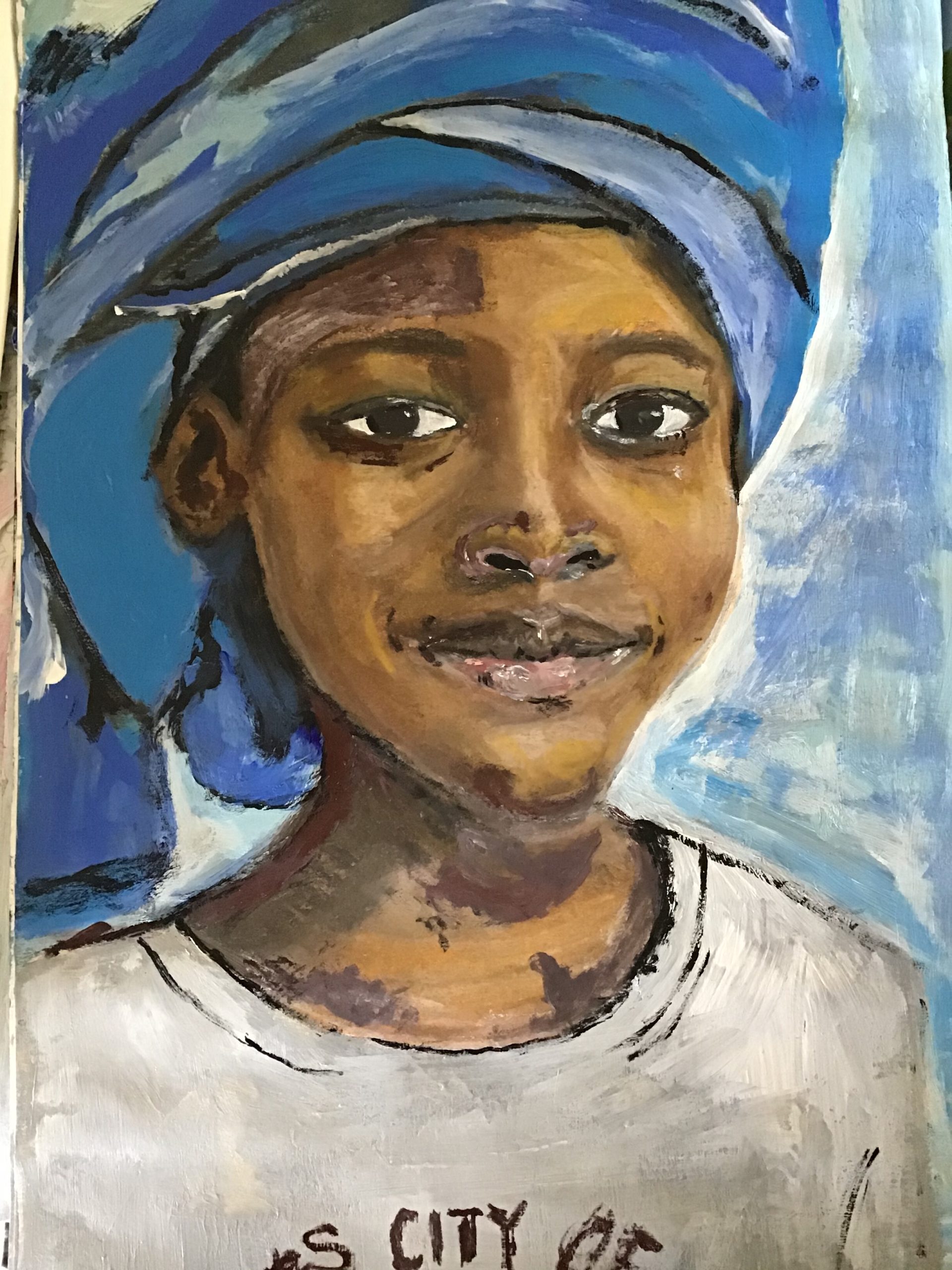
Boy in a Gèlè
The mythology goes – my father’s unruliness earned him a place at the Ransome Kútì School: Straight into that institution, don’t pass go, don’t collect N200, he went. Abeokuta Grammar School was known for the severe corporal punishments and beatings administered to pupils. Fela Anikulapo Kuti, the world-renowned Afrobeat pioneer, once wistfully reminisced on the memorable walloping he received at the very same school that belonged to his parents. As if it were possible to wistfully recall being caned viciously. In any case he sentimentally refurbished his time there while speaking to a journalist. My father never once spoke to us about this school. By the time he arrived there it had earned its dyed-in-the-wool reputation for being the perfect fit for children ‘like him’: Boys who naturally and fearlessly gave themselves the license to do as they liked and furthermore took the liberty to rebel against the Nigerian family’s hierarchical rules. My father landed in Ìdí-Àbá – in that uncompromising place with the unsympathetic motto – Ìbẹ̀rù Olúwa ni Ìpilẹ̀ Ọgbọ́n. The fear of the Lord is the beginning of wisdom. As guaranteed on the packet, he received many thorough beatings to straighten him out, but whether they ‘cured him’ is exceptionally doubtful. Sometimes I hypothesise that the beatings made him more determined to rebel. And likewise, Fela Kútì’s rebelliousness fattened under lashes and underscored the powerful voice with which he sang against the Nigerian government.
My grandfather had caught my father drinking and made him down the whole bottle in one sitting. He was viciously invested in this lesson because his own father, my father’s great grandfather, had been an alcoholic. My father is a teetotaller till today because of that punitive overdose of alcohol and the consequent projectile vomiting it brought on. It might have been that particular incident that won him his trip to Ìdí Àbá or it might have been any of the numerous infractions that was the last straw that crippled the camel…that day outside my grandfather’s colleague’s home perhaps. My paternal grandfather had a habit of visiting friends with his five children, then leaving them in the car while he went into the house. He might stay in the house for an hour or two…or three or four, and all that time, his children had to sit and wait patiently for whenever he was done. It was a peculiar but accepted practice among Nigerian parents, almost as if one was granting the friend or colleague the pleasure of enjoying one’s children …from all the way out in the car… but at the same time trying to be considerate of the friend’s space by not letting them overrun the house. At the end of the visit, the friend/colleague would most likely emerge and greet the children, give them some money, comment on their marvelous ability to sit still and be good. A child left in the car would only dare approach the house if his bladder was falling down to his knees.
During one of such visits, my father who was the second son, broke sacred protocol and without warning bashed his palm on the car horn, not once, not twice, but with the confident pa-pa-ra pa-pa that one uses when one is summoning the residents of the whole street to some exigent disaster. My grandfather rushed out of the colleague’s house utterly…utterly scandalised.
The honking of the car horn was a loud declaration to the whole South-West that my grandfather had no control over his children. And this was a serious thing when he was such an important man. He was the permanent secretary and controller of Agricultural services of the whole Western region of Nigeria.
More pertinently, he was livid.
He drove the children home and held urgent court. Each child was called into a room and interrogated. Who pressed on the car horn? ‘Bafemi Aribisala the youngest, also nicknamed ‘truth-teller’, often derogatively called olowo-o toilet, for being left-handed, was grilled the longest. None of the other children agreed to out my father, no matter the threats, no matter how often and persistently they were asked. Perhaps it was because they would all have wanted to own the liver to press on the car horn in frustration after having sat innumerable hours in the car on more than several occasions. The underlying possibility of rebellious contamination probably sealed my father’s fate.
Wouldn’t that child named Ìwàpẹ̀lẹ́ living under the same roof as my father also start to question his parents, and carry haughty shoulders up to his ears? The fact that my grandparents never found out definitively who pressed on the car horn did not save him. It was an easy guess that it was my father. The incident smelled unequivocally of him, his impudence and recklessness. He ended up in Ìdí Abá anyway because Nigerian parents, in order to hide their terror of such children, must send them away.
He would be the one who dared to jump down from the room above the first floor where he and his brothers slept. Mama agba would be sitting out on the balcony and ní igi imú won, he would jump from the balcony running along the back of the house, down to the ground floor, to go on his mysterious trysts. He was grounded in vain. His nickname was Saliu ẹlẹ́nu gbọ́ọ̀rọ̀ because he was incredibly cheeky and spoke out of turn. He owned incommensurate strength, rarely ever falling ill. Even now, you can conclude that that thing bristling under the impeccable charm is a quiet enjoyment of his individual brew of badness. A bone-marrow-deep thrill of swimming against the current where you break away people’s breath as you swim past.
His parents had long wearied themselves punishing him. Soon enough he graduated to seducer and gambler. He played chess, he broke up radios, toasters, any small electronic thing he could make disappear, just to find out how they worked. He took them apart and put them back together, oftentimes imperfectly but that was irrelevant. He was dangerous and good looking with flawless dark skin. He was sober and extremely calculating. My father relished being bad much too much, and I suppose he discovered his parents’ dirty secret- there’s only so much they could do to him.
His worst crime by far in a family hyper vigilant over recipes for respectability might have been that he took up drawing and painting in Government College Ibadan… The irony was that by the time I came on the scene, my father was a respected general practitioner of medicine who worked day shifts and night shifts. He later specialised in Paediatric medicine. Just once I saw him devastated by a patient’s death. My mother asked us to be quiet because he was down and needed quiet. I peeped into their room and saw that he was sleeping soundly, deeply. Otherwise my father was distant, and his childhood stories were buried deep as deep sleep. He was a foreign language that my mother interpreted for us; oftentimes incongruously to suit her own purposes. He was much worse in her stories and his badness had no rationale. He was just bad. His exploits were mythology that we didn’t bother with because he made us work too hard to read the book. Yet there is one story that stands out in my childhood like a portal into expensive sentience.
It was evening, and my father was home. He was home. My mother was cooking, there was electricity…I list all of these elements because they were rarely all present at the same time. And because I suspect that many Nigerians raze large hectares of their history because of pain. It feels cultural that because there was a fire in the house and for all those years there was a dying child and there was tension; and because the mother slapped the father, everyone came round and threw her out etc, etc. We don’t talk history. History is an acknowledgment of pain. We move the eye of memory away from the aching to the points of joy, and there is a distortion of the whole. All these factors-electricity, coolness generated by fan or air conditioning, potent aroma of cooking, peace…all the well-being generated an exceptional sphere, a rare eclipse of the moon and we were in that space, under the sky and breathing the rarefied air. For a few minutes, acutely present on a stage oiled perfectly for revelation. My mother said to my brother and me,
‘Ask your father to do a drawing for you.’
‘A drawing of what?’ One of us asked incredulously. ‘He cannot draw!’
My mother looked at us and we looked at her. Her failing at that point, as interpreter, was so stark, so outrageous; it became corporeal, like a being without arms or legs floating in the room. She was looking at two children as if we were to know by divine inspiration that our father knew how to generate images with pencil on paper or paint on canvas: That those images were worth generating. That he owned the craft where light was swallowed and emitted as routes of beauty. She was suggesting in that foreign sentence that we would look at what he had put down and be delayed, possibly awed…. This man whose favourite colour we did not know. We did not know what he thought of love, politics, power, red shoes, sports cars, elephants, life, death. We didn’t know he loved to be bad till we were adults. We knew that he loves dogs; he had to watch the 9:00 o’clock news in silence and he was willing to shush us in the harshest terms to do so. He loved fried plantains and beef and stewed chicken. He inordinately loved coca cola and fanta and imported Danish butter cookies in tins. His legs are beautifully shaped and hairless and cut-off the rest of him might pass for a woman’s legs. His uniform when he was at home were immaculate shorts to show off his hot bald legs. His chest fared no better-stingy sprinkle of hair. We knew his best friend was Mr. Ṣógbẹ̀san. We knew he loved to play billiards with his friends at the Eagles Club, Surùlérè.
Otherwise, we didn’t know him. How were we to know that he could draw? Or believe that he could? We stood in the kitchen with my mother, silently arguing the proposition. You didn’t argue with your parents. You shuffled your feet and looked around you. It was ridiculous. My father had nothing artistic about him. He was a doctor and to prove it, he was rarely home because he was elsewhere being a doctor…every day. And it was some sort of joke at our expense, so we weren’t going to go over and ask him anything at all that would result in us being told off and sent out to play. It was like that other joke they had between them where they reassured us we were eating chicken and after we had licked the plate, we found out that we’d eaten the rabbits we had been playing with a few days before.
We were going to wait until the spoken words had dissipated like a peculiar smell, then dash away outside anyway and forget about it. We looked out of the kitchen to where he sat. He could hear us but he made no move to acknowledge that he could, didn’t turn round to confirm what had been spoken. No invitation in his body language to come over. That fact made it more difficult to walk over to where he was and ask… and hand him someone’s drawing book and blunt pencil. Here again I must insert this thing about many Nigerian families, the abhorrence of sentimentality or show of emotion (‘have you eaten?’ means I love you), the firm refusal to ease toughness that we built when my sister died and my brother died and someone became bipolar and we all pretended it didn’t hurt because it made sense to carry on…and on…and on. You just have to carry on.
We watched my father’s head and shoulders like parts of a wall and I can speak for myself, the fear of touching that wall was overwhelming. I was not going to be the one to ask him to draw anything. In any case, my brother was older, so he had to do it. In the end we took the pad and pencil over and stood like we were Siamese twins for protection, and handed it to him, and he silently took it and drew….
The thing is, and I am not sure why the thing is…Nigerians bury things in the ground until the ground can’t take one more buried thing and cracks open. You only realise it when you talk with other Nigerian friends from your generation, or when you become a migrant in a city called London, and in the space where Nigerian words used to begrudge habitation, toilet rolls, bus stop stalls, shampoo bottles, yogurt cups talk to you…everything explains its existence…When you move to a country where everything inanimate is voluble (‘mind the gap’), corpses jump out of their Nigerian burial plots without your consent. That arcane belief about really evil men, the worst men, manifests- you know the one that says that you can’t bury them deep enough, even if you did it past the customary six foot, you will come and find them violently exhumed, heaved in disgust in debris of shattered coffin wood and minced soil.
A boy’s head and face slid out of my father’s pencil onto paper like some shaman’s taster before the main act. Where it was coming from, we could not decipher- surely not his hand. Was it brain matter, or genetic item or airborne or spiritual possession? We strained every nerve on the puppet strings of raised eyebrows – because if that sheet of paper had not come from our messy pads then we would have sworn he was tracing faint lines hidden on the page. He kept his head lowered in concentration over the task in his lap. His bowed head was below our own heads and we surely snuck incredulous looks at each other over his hair. The closest you ever stood to him was when you were shivering with malaria and he discarded his stethoscope and put his head on your chest to listen to your breathing. His head burnt a hole in your overheating chest. Here he was pouring out a little boy’s perfect forlorn expression in an oval head. Today I am surer of the magic he performed than that day because I have tried and failed many times to draw a little boy’s face. I can do it but it is difficult. Your pencil has to press down and float. You use lines sparingly. The lines you see, you sometimes pretend aren’t there in order to save the integrity of innocence.
D.J. Bullock was principal of Government College when my father, and my left-handed uncle ‘Báfẹ́mi were students there. He was a Durham man who had been a miner at Yorkshire Main, five miles from his home in Doncaster. He became an Education officer in the British Colonial service and landed in Marina, Lagos in September 1950. In 1956, after a few educational postings, he was promoted to Principal of Government College Ibadan. Government College was an extremely prestigious school, probably the most prestigious secondary school for boys in the South -West of the country. It took itself very seriously and only admitted that one school — Kings’ College, Onikan was possibly of the same standard in Nigeria. Every Government College opened up limited places to new students. It held rigorous examinations you had to study hard to pass. You couldn’t walk off the street and trounce these exams. You needed private tutors, months of lessons. If you passed the exams in the top tier of dozens of applications, you had to thereafter spend a period of time on the campus being observed to clarify whether you were GCI material. After this long process, only a few boys were accepted into the first form.
Bullock was an interesting choice for the principal because he probably had been scrutinised ferociously by the likes of TSB Aríbisálà, my grandfather, an alumnus of the school. Government college had an old boys association whose opinion was consulted on major decisions. My grandfather and his influential peers made up the body of that association. My grandfather had an unexplored problem with white men (he had forbidden his brother from marrying a white woman based solely on her whiteness), he also had a problem with the creative arts (he was the first son before 5 sisters. He supported them all and had no romantic ideals left afterwards to tolerate any profession that did not guarantee a 9-5 job.) Yet somehow D.J. Bullock with an essential creative arts agenda was recruited to head the school. In the old boys’ views hedonism and the arts went together. If you were bringing up a young man properly, his focus had to be on medicine, political science, engineering, agriculture.
Fine arts, visual arts, theatre arts and all such other ridiculous career paths were barely suitable for young women who one allowed leniencies because they would end up marrying and bringing up children. Women again might not be allowed these career paths because they would have to present themselves in ways that would make marriage awkward. Women on stage for whatever reason were equated to women of easy virtue. GCI’s Old Boys Association was made up of men who had been young boys in missionary schools where they weren’t allowed pockets nor shoes because both gave little black boys airs. Men who were Nigerian civil servants and economists and permanent secretaries and governors and ministers and surgeons. D.J. Bullock in his time at Government College was renowned for his professionally produced stage plays. He built an auditorium for the performing arts. Wọlé Ṣóyínká was invited to coach students in staging his play– The Strong Breed. My uncle, ‘Báfẹ́mi, who hated the Ba extension on his name and shortened it to Fẹ́mi was commended on his brilliant playwriting and after executing with great promise his part in The Strong Breed, received glowing approbations on ‘acting’. If news of all this reaching my grandparents’ burning ears from the mouth of friends, was not the six-inch nail in D.J. Bullock’s coffin, then surely it was ‘Báfẹ́mi’s older brother -–the one who came from the Ransome Kútì’s school and had all these quirks that his family had been ironing out for years, he was also now being encouraged to draw and paint and aspire to the study of fine arts.
…I have to refer to my mother’s telling of this story to adequately express the rough feel of the cloth of the events that followed. My mother told me that some teacher who was getting ahead of himself and encouraging my father to draw and paint was sacked from the school and my grandfather was very much behind the man’s sacking. She did not say that some brilliant principal affectionately referred to as Deejay was moved against by the Old Boys Association for promoting the creative arts and demoted to a Comprehensive High School in Aiyétòrò. He was forced out and replaced. She did not say that he was British and foreign. She said nothing about competence or long-sightedness. All he was was some minor player in the scheme of things-some dreamer who decided to foolishly underestimate the expectations of parents for young men from prestigious Nigerian homes who had to step into their father’s oversized shoes.
He and his beautiful ideals were like the brightly coloured canary in the Yorkshire mines spotted expiring on the floor in the dark. The same one that provoked emergency evacuation of those whose lives were worth more than his. My mother hinted that this teacher might have been heartbroken at the death of his vision for the gifted pupils in his school, his separation from his beloved boys. Those boys in gele, with prodigious heads to match prodigious burdens.
Or perhaps I saw him all by myself without her saying it, holding his chest from the brutal impact of rejection. Heartbroken more so because of the conscription of his brilliant left-handers and artists and playwrights and actors to the mines of responsible career choices. If he hadn’t exposed these young men by encouraging their talent, perhaps they would have slipped past their ruthless jailers. Too late, they were now guarded day and night to prevent them from committing crimes of writing plays, drawing, singing, dancing, painting, pirouetting under the lights.
My uncle says he doesn’t understand how my father became a doctor. Wasn’t it engineering he was going to study? How would I know? Was how I responded. It made sense for the boy who broke up radios in secret to figure out how they worked. If he couldn’t become an artist then possibly an engineer. More significantly there was that brilliant wasted ability that flowed from hand to paper and replicated trees, birds, faces, sky, earth, beauty, loss, light… in a way that made you catch your breath. The ability so obstinate it popped its head up in three generations and refused to take no for an answer. I in turn wonder how my Uncle Fẹ́mi can ask me this question when in order to avoid the rap against his left knuckles, he became nervously ambidextrous writing with right and left. He surely knows better than anyone that in order to evade the prison warden, you switch hands from left to right.
_________
Yemisi Aribisala is a prize-winning author and an auto-didactic painter. Her work has been published widely, especially in The New Yorker, Chimurenga Chronic and Vogue UK. Her essays are a lens through which the complex entity of Nigeria can be observed. She lives, writes and paints in London


